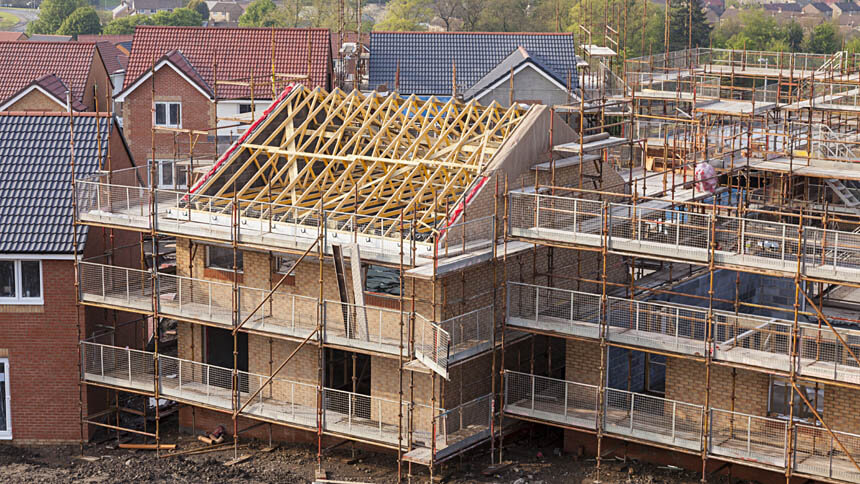As part of London Climate Action Week 2023, the UK Green Building Council (UKGBC) publishes new guidance to empower the built environment industry to deliver an ambitious approach to carbon offsetting and associated carbon pricing that supports the shift towards net zero buildings.
For a building to achieve net zero emissions, it is essential that built environment professionals follow a science-based decarbonisation pathway that prioritises reducing emissions in line with 1.5˚C.
Once embodied carbon and energy use intensity limits have been achieved, responsible carbon offsetting has a crucial role to play in the transition to net zero carbon buildings.
However, purchasing offsets from the voluntary carbon market can be challenging due to its lack of maturity and transparency. This can increase exposure to greenwashing accusations and have detrimental impacts on climate action.

For the UK’s carbon market to succeed, it is vital that the industry has access to clear guidance, is supported by a robust global governance system, and we work together to gain consensus on this complex topic. Published today, UKGBC’s guidance on ‘Carbon Offsetting and Pricing’ seeks to address part of this challenge by equipping those who purchase offsets or make investment decisions at building asset or organisational level with guidance to do so in a way that aligns with their climate goals and accelerates the wider transition to net zero.
Drawing from established industry thinking and input from a group of industry experts, the guidance provides a step-by-step process to enable a more holistic approach to carbon offsetting which goes beyond basic procurement of voluntary offset credit and encourages the widespread adoption of internal carbon pricing. In recognition of a rapidly changing carbon market, the publication sets out three levels of ambition industry should work towards – ‘minimum requirements’, ‘good practice’ and ‘leading approach’ – whilst providing guidance for organisations to develop a pathway to adopt a leading approach.
The guidance highlights how carbon pricing can be used as a powerful mechanism to accelerate the decarbonisation of built assets and the wider industry. However, it stresses the need for greater ambition when setting an internal carbon price, given that the cost of accredited carbon credits on the voluntary market do not accurately reflect the full societal and economic cost of emitting carbon into the atmosphere. Further key aspects of the guidance include:
- Clarity on different offset typologies available in the market and illustrates why it is essential to accelerate the transition to carbon removals with long lived storage by 2050.
- Encouragement for practitioners to support a just transition to net zero globally through continuing to support projects available internationally. However, the guidance notes increasing availability of offsetting projects locally, or nationally in the UK, will further unlock the UK’s path to net zero.
- Providing practitioners with the vocabulary to describe key offsetting and internal carbon pricing terminology and principles.
Yetunde Abdul, Head of Climate Action at UKGBC, explained: “Designing for reductions in whole life carbon and improvements in energy efficiency will always remain the most important steps to prioritise when seeking to achieve net zero emissions across a built asset. Once these deep reductions have been delivered, responsibly offsetting residual emissions remains a critical component of achieving net zero.
“This guidance is crucial in equipping organisations seeking to accelerate the net zero transition to go beyond the procurement of voluntary credits to compensate for their residual emissions, towards a leadership approach which promotes social equity, restore ecosystems, and drive positive change within, and beyond, the built environment value chains.”
Andy Haigh, Director, Climate Positive Solutions at Grosvenor, said: “While absolute emission reductions should always be the priority, offsetting is a fundamental part of any net zero transition plan.
“We’ve seen too many examples of this done badly and UKGBC’s guidance will help companies ensure they’re purchasing high quality offsets that support communities and positive outcomes – a win for the planet and the maturity and credibility of the offset market.
“We know that companies with science-based decarbonisation pathways that also commit to purchasing carbon offsets reduce emissions faster than those who don’t. We have an opportunity as a sector to take real leadership in this space and offset today what we cannot reduce, so that together we can accelerate the UK’s pathway to net zero.”
Today’s publication updates previous UKGBC guidance on carbon offsetting and reflects the evolving nature of industry practice and stakeholder expectations around best practice. As the industry’s efforts to decarbonise are continually assessed and more information is obtained on the scale and pace of actions required, UKGBC plan to update this publication.
This project forms part of UKGBC’s Advancing Net Zero Programme, which has been made possible this year thanks to the generous support of our Programme Partners: BAM Construct UK, Berkeley Group, Buro Happold, CBRE, Grosvenor Property UK, Hoare Lea, ISG, JLL, Lloyds Bank, ROCKWOOL UK, Turner & Townsend, and Project Partner: Arup.
The group of industry experts who supported the development of UKGBC’s guidance include:
- Hayley Maynard, Principal Consultant, AECOM
- Jamie Quinn, Sustainability Director, Argent
- Stephen Thompson, Associate, Arup
- Sarah Jolliffe, Environmental Sustainability Business Partner, BAM UK&I
- Helen Wickham, Head of Sustainable Business and Reporting, Berkeley Group
- Chris Brown, Exec Chairman, Climatise
- Gilbert Lennox-King, Founder/CEO, Construction Carbon
- Bevan Jones, Director (NZ), EVORA Global
- Katerina Papavasileiou, Associate Director – Real Estate ESG and Responsibility, Federated Hermes
- Frank Blande, Sustainability Lead, GPE
- Andy Haigh, Director, Climate Positive Solutions, Grosvenor Property UK
- William Naismith , Senior Sustainability Consultant, Hoare Lea
- Chiara Essig, Director, JLL
- Hannah Rich, Head of Sustainability, Lendlease
- Ben Coulter, Head of Sustainability Operations, London Legacy Development Corporation
- Kathryn James, Public Affairs and Sustainability Advisor, ROCKWOOL UK
- Hayley Binns, Sustainability Manager, The Crown Estate
- Marco Longhini , ESG Analyst, Tritax
- Mark Rogers, Associate Director, Turner & Townsend
- Chloe Goudling, Advisor, UKGBC
- Gabriela Costa, Principal Sustainability Consultant, Places Lead, Useful Simple Trust
- Liath Campbell Consultant, Verco Global
- Arun Thaneja, Technical Services and Sustainability Director, Winvic Construction Limited




















